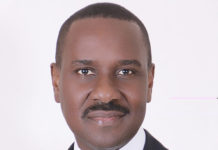John Iwuajoku is the Managing Director and Chief Executive Officer of Clearline HMO, a leading health maintenance organisation in the country. He is a consummate finance expert with over 23 years’ professional experience in the financial services industry spanning various aspects, which include banking operations, cash management and branch Coordination, among others. At Clearline, he leads a team laser focused at redefining customer experience and delivering refreshing value propositions in the industry.
In this interview with Peter Adelowo he spoke about the imperative of health insurance, the abysmal low coverage of Nigerians in the scheme, medical tourism and Clearline HMO plans for all strata of the society in the country.
What Is Clearline HMO All About?
Clearline HMO is a health maintenance organisation and we are into providing affordable healthcare for the populace in the country.
The company is now part of Greenlife Pharmaceuticals, what is the new direction for Clearline with the merger?
About two years ago, Clearline HMO had a strategic investment by Greenlife Pharmaceutical, one of the giants in the industry and that gave rise to 100 percent acquisition of the company. With the acquisition also came a significant capital injection into the company. Clearline has been around for over 28 years as one of the pioneer HMOs in the country and with the acquisition by Greenlife Pharmaceutical, it also gave the company greater strength to be able to play deep in the market and attain leadership position. So, one of the things that immediately happened with the acquisition was to bring back the confidence level among our enrollees, the corporate world and the nation in general. We have also shored up our capital position from the regulatory requirements of N400million to N1billion, which is about two and a half times what we are supposed to have. The essence of doing that is to effectively equip us to be able to play in any space that we want to, because there are quite a number of spaces that we are planning to disrupt in the healthcare insurance sector. And for us to do that, we need significant capital. So we’re not just trying to offer the plain vanilla set of services, but that space is likely untapped.
Today, when you look at the percentage of people that have one sort of healthcare insurance or the other, it is still less than 5 percent of the population in the country. So that just gives you an insight into a large pool that doesn’t have any kind of healthcare cover. So part of our mandate is to come up with value-added products that are affordable to the common man out there and to every strata in the society. So we want people to be able to afford healthcare and to also understand the benefits of healthcare insurance and how it can really help them, even at the point of need. For us, we are working deep at disrupting the market, providing pocket-friendly, very robust benefit packages that will suit different people in different markets. We work with over 1800 healthcare providers to make sure we are able to provide these services, because we have a national license that enables us to operate in any part of the country. We also have branch offices and representative offices across the nation. So that enables us to penetrate the market space to also unlock the retail opportunity.
The common man needs to be aware of the benefits he or she stands to get in that space and also come to realisation that, there are even plans that for as little as N1000 a month, you can enjoy healthcare benefits that give you a cover in excess of N1 million. You know, a lot of people don’t know this information and they don’t actually know the benefit therein. So for us, we are driving that kind of awareness campaign and at the same time, we are coming up with products that suit different categories of people in the market space and also using technology to drive it. Because of the kind of numbers we are looking at, when you have over 90 per cent of people that are not covered, you know that the easiest way to drive this adoption is through technology. And that’s what we’re doing right now. So we are leveraging a whole lot of technology to make sure that we are able to deliver this kind of service and quality experience. And that has given rise to a whole lot of things that we have deployed recently.
So how is your parent company planning to backup Clearline on achieving these objectives?
 Greenlife is a pharmaceutical giant that has been in the marketplace for a long time, so they understand that space. So the kind of expertise they have is also supporting us at Clearline. We are driving the vision of the company, which is we want to be the healthcare provider of choice for all the populace. That is why our parent company has spared no effort and amount, to ensure that those laudable initiatives that we have, get the right financial backing for us to acquire the right technology, the right people and the right set of partnership to be able to deliver in a seamless manner. So we have support from our parent company to make sure that those initiatives that we have planned out and implemented, are not hampered in any way, be it financial, or even the level of expertise we have from our board of directors to make sure that we have the right guidance to deliver on those things.
Greenlife is a pharmaceutical giant that has been in the marketplace for a long time, so they understand that space. So the kind of expertise they have is also supporting us at Clearline. We are driving the vision of the company, which is we want to be the healthcare provider of choice for all the populace. That is why our parent company has spared no effort and amount, to ensure that those laudable initiatives that we have, get the right financial backing for us to acquire the right technology, the right people and the right set of partnership to be able to deliver in a seamless manner. So we have support from our parent company to make sure that those initiatives that we have planned out and implemented, are not hampered in any way, be it financial, or even the level of expertise we have from our board of directors to make sure that we have the right guidance to deliver on those things.
You have come up with new products, how are you going to ensure they break into the market space?
In a nation where you have over 93 or 94 percent without any kind of healthcare provision and our plan is to penetrate that market significantly, you have to massively leverage technology to do that and make sure that everybody has access to healthcare. The primary thing in healthcare is having quality products and the ease for people to buy those plans when they want, without having to refer them to a physical location. So that has driven us to deploy a mobile app through which you can actually look at the plans, decide the one you want and make a purchase and get registered. That app gives you a whole lot, it shows you your benefit package and you have your own virtual identity card. It also shows you hospital networks wherever you are in the country. And from that app, you can potentially chat with people at any point in time when you have needs. The app has that functionality where you can reach us anytime. We also have a very robust call health solution that enables us to interact with the enrollees, the providers and the corporate customers. That call health solution immediately gives you access to us anytime, in a robust manner and it gives you that self-service capability. So you’re able to carry out anything you want to do on that platform. We also run a 24 by 7 multilingual contact centre. So at any point in time you can actually reach us, and reaching the contact centre is not just via call, you can reach them by calling, through emails or by chats, leveraging on WhatsApp chat or through our website. So those channels have been created to make it easy reaching and interacting with us.
We have also created a platform through which we can measure the performance of the providers that we partner with. Periodically, we carry out impromptu checks and periodic checks on these providers. After these checks, we remove those that don’t meet our requirements. And as new ones come on board and meet these requirements, we enlist them, the essence is to make sure that we would have quality healthcare providers that will give us the kind of service that we want our enrollees to have access to anytime. So it’s an ongoing process, it never stops because we are not ready to settle for anything less from a quality point of view. So for all our providers and partners generally, we have a minimum benchmark that guides all we do. It is not just the providers; because when I talk about providers, I don’t just look at them as hospitals.
We also have an initiative where our enrollees that have pre-existing conditions that may have impacted mobility ability, get certain drugs periodically. Rather than go through the stress of going to those facilities, we deliver those drugs to them through our network of partners nationwide. So they also have a service level agreement with all those partners to ensure that those things are done at the right time. So that level of efficiency is what we drive and we don’t compromise on them.
How true is the perception and claims that HMO services are expenses?
HMO is an assisted service and it’s not really expensive. We have plans that for as little as N800 or N900, a month, you could have annual coverage. We have gone down to that level where it becomes affordable for everybody in the country. You can imagine having a plan that is worth about N12, 000 that gives you coverage in excess of N1million. What we realise is that the awareness, generally in the HMO space, is not as intense as it should be. And that’s one of the things we’re doing to drive that awareness for people to actually know the strings of benefits they can get and to know that the essence is that you’re paying little and you gain access to quality healthcare round the year. So when you are out of pockets or low on finance, you can still assess care. So it’s not really expensive. What we have done is to make sure that we have a different plan that speaks to different sets of people, different categories in the country, starting from the people at the lower end to the high network individuals.
It seems HMOs are only popular with companies and organisations, how can the ordinary man on the street get healthcare insurance?
The popularity stems from the fact that it’s actually regulatory for corporate organisations to have healthcare provisions for their staff. So that may be one of the reasons why you tend to hear more about companies enrolling into HMOs service. But as we move into the retail space, for now, it’s not mandatory, it is optional. For us in the HMOs, we are doing a lot to drive that awareness campaign. And for you to do that, you need to come up with a value proposition that makes sense to the common man why he should invest as much as N800 to N1000 in health insurance. The common man too can access these healthcare services. It is what I said earlier about our mobile app, which is out there on the app store. You can download it, look at the plans, and once you buy, you are in. So you don’t have to come to our branches to do that. That’s the level of simplicity. You don’t have to work for any company or belong to any organisation before you get health insurance. When you look at our plans, we have what you call a corporate plan, which is meant for companies, we also have what we call the retail plan, that’s meant for individuals. The retail plan is what any person out there, irrespective of whether you’re a businessman or an artisan, can subscribe to, and it is targeted at different people at the retail level. We also have plans for individuals and family, so we have robust plans that cover the entire family. The key thing is just for us to continue to drive that awareness so that everybody out there actually knows the benefits and the ease of enrolling.
What are the benefits in subscribing to health insurance plans?
The benefits are numerous because with a health insurance plan, it gives you access to a robust care for the year and it covers a whole lot of things that ordinarily, you may not be able to afford if the need do arise, because it’s almost like you’re buying a plan for the future. You are buying the plan now against any time you may get ill, irrespective of what those illnesses are, as long as you’re covered, you don’t speed a dime.
Are you satisfied with the way health matters are being handled in the country?
There is always room for improvement. If you’re looking at the numbers, then it’s sufficient to say that it’s not satisfactory. Because if the level of coverage now is around 4 per cent, that means 96 per cent of Nigerians don’t have health insurance cover. That is abysmally too low and it’s quite worrisome.
So how can we reverse the trend and increase coverage for more Nigerians?
At the moment, one of the things that is going to drive it is something like compulsory healthcare insurance nationwide that should go through the National Assembly. The National Health Insurance Scheme (NHIS) has been trying, but some of these things need enabling laws and acts to push them. Those that have been passed so far are what NHIS used to drive participation. Because today what you see is that the significant number of public lives that are enjoying healthcare insurance are driven by NHIS, while the HMOs are also driving the corporate space. So we manage the corporate space and public lives. We have hundreds of thousands of public lives that we manage through NHIS and those people are having access to quality healthcare. But the opportunity size is significantly high, and that’s what we need to tap into. And that’s where we continually think of how we can unlock the retail space, because that’s where the vast majority of people are, over 90 per cent. What you find is the retail space, the SME space occupies that space. And those are the areas we are coming up with value added plans that will make it quite affordable for everybody.
Funding is a major challenge in the health sector, how can the government raise the standard of healthcare in the country?
I think it requires the participation of everybody, not just the government. Private participation is also required. Yes, the level of healthcare facilities in the country is quite low. And it makes a lot of people worry, but what you see increasingly is that there’s a lot of push from the side of the government to really take a critical look at that and start providing quality facilities for government facilities. We have started seeing a recent trend where private players are also coming into this space and coming up with quality hospitals and medical facilities that will aid us. So it’s a combination of everybody coming in together to drive it. I don’t think the government alone can do it.
At the federal level, enabling bills and those things will also give rise to provisions in the budgets to cover for health matters. And the trend you’re seeing now is that state governments are also beginning to take charge and paying more attention. A lot of states, including Lagos and Kaduna, have activated their healthcare initiative. In fact, more than 10 states today have started. As they do that, they are also making sure that they equip those hospitals. I’m sure you can see most of these Lagos State owned facilities are going through significant upgrades right now. And that is providing quality healthcare for the population in the country. So it is an ongoing thing and it never gets to a point where you say you’re truly satisfied, because technology continues to change. Procedures for treatment continue to improve and there are new advancements in technology, and this will require significant investment. As long as we have a government that is beginning to look at those things, we are confident that those concerns would be addressed. But are they at a stage that is worrisome now, yes. Are there improvements? Yes there are improvements.
The good thing is that there are new players in the industry, particularly in the private space, that are also trying to make sure that we come up with quality facilities that will bridge that gap. So we are also taking advantage of those facilities to make sure that our enrollees have access to quality healthcare.
Medical tourism is becoming a major challenge to the development of the sector, how can it be addressed?
Medical tourism is one of the largest sources of outflow in the country today, it is significant. But there is a need to drive a culture change. Public servants are being asked to use facilities in the nation, but we can’t achieve it by just saying it. Driving that culture change is not just by saying it, but also by carrying out certain things that will give people reasons to believe in the quality of healthcare domestically. And that’s what we are seeing beginning to happen now where you have world-class facilities that are coming up in the country. Those are the kind of facilities that will give people the belief that they can truly leverage on our healthcare infrastructure. Our parent company for instance, Greenlife Pharmaceutical, is currently building a world-class cancer centre. Now once that is completed, you won’t have any need to go overseas for cancer treatment.
On the HMO part, what we have also done is that you don’t actually have to fly abroad to have access to those things. We have created different partnerships internationally through which, while you are still in Nigeria, you can have access to those doctors globally, leveraging on different kinds of technologies that we have today. So you can get a second opinion or advanced opinion without having to travel. Those things are now embedded in the kind of plans that we offer. That makes it a lot more robust, that you can have access to those international second opinions or standard opinions without traveling. Private individuals that can afford it, when you engage them, the primary reason they want to travel for treatment is that they don’t believe in the quality of healthcare that we have in Nigeria. But when you now have those qualities here, there is no reason why they will travel to do that. And that’s why I said that those changes are not driven by just you saying it, but by putting structures in place that will give people reason to believe that they can actually get the kind of service they want in Nigeria, and that is already happening. I’m glad to say that we’re also partaking in it through our parent company that is building a cancer centre here.
For us at Clearline, it is an opportunity for us to contribute immensely in the country by providing robust healthcare at an affordable rate, not just to the corporates or to the SME, but down to the retail space. So you notice that we’re playing all spaces, we are partnering with state governments to provide quality healthcare. We are also penetrating all parts of the country to provide healthcare. And that’s why, if you see our suite of products, we have those that appeal to every strata of people in the economy and we are also driving the awareness campaign. Once people know, they understand the benefits and we have a seamless way of getting those plans, activating them and using them, whether you live in the comfort of your home, then you see that its becomes a lot easier for people to do that. And that’s what we are beginning to witness now. A lot of people are buying our plans online or buying it through the mobile app without having to leave the comfort of their home. And from there, they start accessing care, So we try to make it as simple as possible, so that people don’t have any difficulty in accessing care at any point in time. So it’s a continuous thing for us and our mindset is that of a never-ending change mindset, because we will continue to innovate around that space to make sure we will continue to maintain our leadership role in the HMO space.
We are on different channels. We run a 24 by 7 contact centre, we have our digital, Whatsapp, Twitter and Facebook channels and other social media. We know many people are active on the social media space. We are presently there, engaging our enrollees and providing awareness.




























